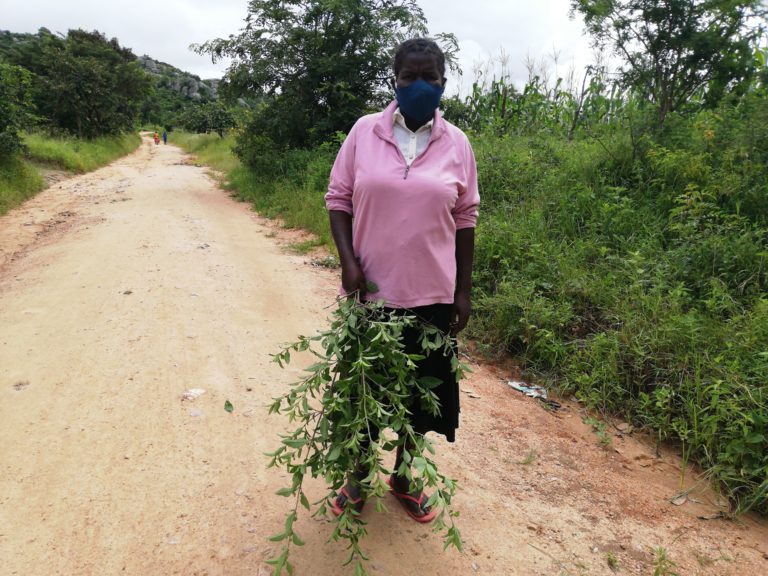Nickson Mpofu (38) a resident of Cranborne, a medium-density suburb in Harare the capital of Zimbabwe, recalls how they used tea leaves to treat colds growing up in his rural home, Zvishavane.
As a young boy, he did not know the plant would one day treat the symptoms of a novel virus: COVID-19.
Last year, after many decades he realized the power of the plant in saving lives when he was diagnosed with COVID-19.
“I first developed a severe headache. I suspected it was just flu,” he tells Ubuntu Times.
“As the day went on the headache and fever became worse.”
Mpofu went to a COVID-19 testing center in Harare where he tested positive for Coronavirus.
He was asked to quarantine at home.
At that time little was known about COVID-19, thus, Mpofu turned to Zumbani tea leaves.
“I took Zumbani tea leaves. I also steamed using Zumbani, lemon, gum tree and guava tree leaves,” he said.
Since March 2020 when Zimbabwe recorded its first COVID-19 death, people have been using local remedies such as Zumbani to treat illnesses related to the virus.
Zumbani, a woody erect shrub that grows naturally in Zimbabwe and other African countries, is known scientifically as Lippia javanica.
Up until now, the world is battling to find a cure to the pandemic.
But as research efforts go on citizens of poor countries, who can hardly afford medical treatment have had to rely on local remedies to treat the symptoms of COVID-19.
Several countries have developed vaccines that are currently being rolled out including United States’ Johnson and Johnson, Russia’s Sputnik V, China’s Sinopharm vaccine.
After receiving a donation of 200,000 Sinopharm vaccines from China, Zimbabwe rolled out its COVID-19 vaccination program on the 18th of January 2021.
The initial phase of the vaccination program targets health workers, members of the security sector, and journalists.
The government aims to inoculate 60 percent of its population of over 14 million people with vaccines from China, Russia, and the Far East.
In April 2020, the government allowed traditional herbalists to treat COVID-19 using herbs since very little information was available on how to treat the symptoms of COVID-19.

The southern African nation is experiencing its worst economic crisis in decades which has hit the health sector characterized by shortages of medicines and personal protective equipment (PPEs).
Poor countries like Zimbabwe are struggling to purchase vaccines for their citizens.
They are relying on vaccine donations from developed nations.
Towards the end of 2021 COVID-19 cases surged as Zimbabwean residents returned from neighboring South Africa for the festive season.
As of the 16th of March 2021, COVID-19 had claimed the lives of over 1,500 people while infecting more than 36,500 people in the southern African nation, according to the Health Ministry.
At this time, the majority of people in Zimbabwe—constituting almost 80 percent of the population resorted to using home remedies to treat common illnesses before seeking modern medical care services, according to Itai Rusike, the executive director of the Community Working Group on Health, a network of community-based organizations.
Another Zimbabwean, Constance Makoni says her parents tested positive for COVID-19 in July 2020 and they took Zumbani and other home remedies.
“When they tested positive we asked them to steam. My father was in terrible shape. He was not breathing well.”
“My parents could steam 15 times a day. They also drank Zumbani tea leaves. My father was later put on oxygen. They all recovered,” she said.
Zimbabwe is not the only country that at the height of the pandemic resorted to home remedies.
Other African nations such as Madagascar and Tanzania authorized and promoted the use of home remedies to cure COVID-19.
In April 2020, Madagascan President Andry Rajoelina launched a herbal tea that was marketed in bottles.
The herbal remedy made from artemisia-a plant with proven efficacy against malaria, according to the Malagasy Institute of Applied Research.
This herbal remedy was reportedly exported to other countries.
In Tanzania, President John Magufuli, who did not put the east African nation on lockdown while declaring it COVID-19 free, also ordered a shipment of the Madagascan herbal to treat the respiratory disease in May 2020.
Magufuli died from heart-related complications aged 61 on the 17th of March 2020.
In Zimbabwe, there has been a rise in the number of traders packaging Zumbani tea leaves, for sale in major cities.
The World Health Organisation has been urging nations to use scientifically proven traditional medicine to treat COVID-19 related illnesses.
Zimbabwe’s Health Minister Constantino Chiwenga has encouraged medical facilities to undertake a scientific study to ascertain the efficacy of traditional medicine and herbs to combat COVID-19.

Africa University, located in the eastern part of Zimbabwe, is in the process of developing cough drops made from the Zumbani plant.
The cough drops are not going to be sold as a pharmaceutical drug for now but as a herbal remedy and will be available commercially in one month’s time, according to Africa University.
Despite its popularity among poor Zimbabweans medical practitioners are not convinced that it can treat COVID-19.
“Zumbani is a herbal remedy which is probably good for general health and wellbeing. It has been found to have antioxidants like rooibos. It has no known specific effect against any particular bacteria or virus,” Shingai Nyaguse, president of the Zimbabwe Senior Hospital Doctors Association tells Ubuntu Times.
Medical experts say prolonged use of the triterpenoids in Lippia javanica causes liver damage, with jaundice being the most notable result.
















